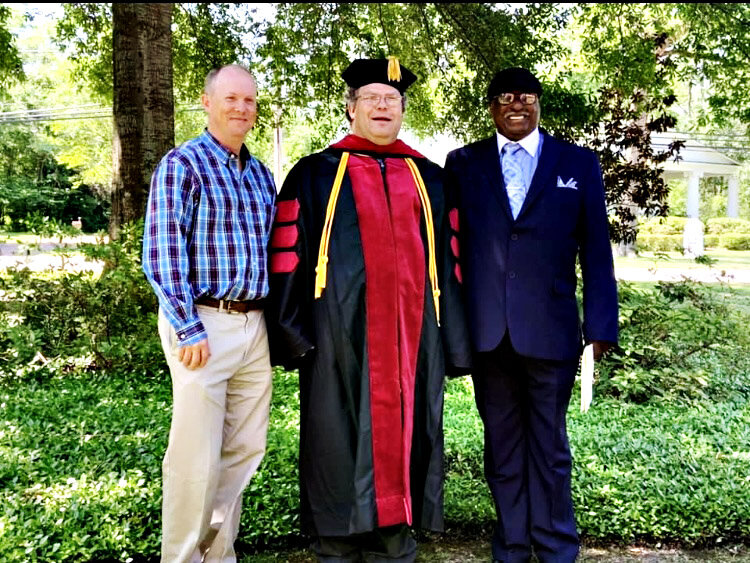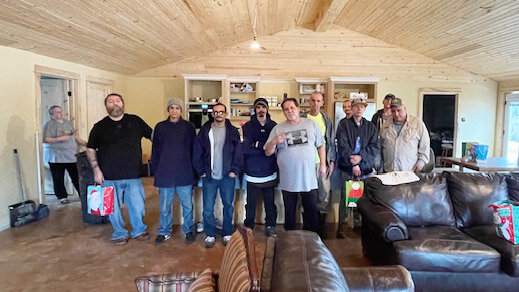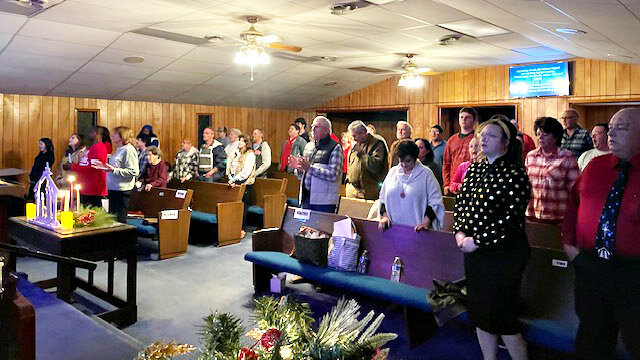March 11, 2024
Alumni Spotlight
Pastor Matthew Pharis (D.Min. ’21) sees a ministry to homeless men and a new church plant grow out of his research on the “means of grace”
Matthew Pharis already had written 80 pages of his doctoral dissertation on the “means of grace”—representing 8 months of work—when his professor, Dr. Matt “Friedy” Friedeman told him he needed to throw it away and start over. It could have been a devastating moment. However, Matt’s response that day started an adventure with God that would ultimately result in two new ministries being created, and countless lives being transformed.
A down-to-earth Mississippi who has been pastoring since he was 19 years old, Matt never sought a doctoral degree just to add a title next to his name. “I never approached my classes with the mindset, what do I have to do to pass this class and get my degree,” he says, “I just looked for how I could use what I was learning to actually make a difference in my ministry and hopefully change more lives.”
So, when confronted with the possibility of throwing away eight months of work, Matt leaned in to see what he could learn. Like many students, Matt’s topic was too broad. Friedy and Dr. Steve Blakemore encouraged him to focus on just one of Wesley’s means of grace: prayer. At first, Matt was skeptical. Would he be able to get ministry results with such a narrow focus? He says he will always remember Dr. Blakemore’s challenging response at the oral defense of his dissertation: “What do you think will happen if you bathe a community in prayer every day?”

Matt Pharis (center), with Thomas Calhoun (left), who donated the land for the homeless shelter, and Pete Carter (right), co-pastor of Means of Grace church.
Matt not only rewrote the dissertation, but he also put it into practice in his community. He was pastor at the time of a Methodist church in Puckett, MS, a small town not far from WBS. Gathering a small group of 5-6 prayer warriors who committed to come to pray daily for the 40 days of Lent, Matt proceeded to set up prayer appointments all over the city. They prayed for the mayor, at the police station, and the volunteer fire department. They prayed for individuals who were sick at home, in nursing homes, and at daycare. They went to another church on a Wednesday night to pray for their youth group. In addition to their core group, dozens of people would often join them as they posted each day’s prayer assignment on social media.
Growing in Grace
This initial prayer movement had two results: first, new people came to the church, and began to seek how they could come to know Christ and grow in grace. Second, the church encountered people in need and began to “run toward the sound of the pain,” as Friedy often puts it. In particular, they began to serve the needs of homeless men, and a new ministry was born called “Means of Grace.”
Means of Grace’s approach to homelessness was two-fold. For those caught up in substance abuse, he was able to connect them to effective treatment ministries already established in the area. For the rest, they followed a historically Wesleyan model: they connected them into small groups in the spirit of Wesley’s bands and classes and began practicing the means of grace with them.
As WBS students will know, means of grace are not duties we perform to earn God’s favor or make ourselves more sanctified. “We read scripture together, pray, partake in Holy Communion, serve one another, and share holy conversations,” Matt explains. The results are both miraculous and predictable: When people use the means of grace, their lives are transformed. Matt says it is amazing to see men who once had no hope walking in holiness, serving as leaders in the church, and helping lead others to Christ.
Abundant Provision
As the ministry grew, Means of Grace had dreams for their city, but little money to realize them. That proved to be no obstacle for God. One day as Matt described their dream of land for a homeless shelter to a Baptist deacon who had become involved in the ministry, the deacon responded, “I have the piece of property you are describing.” Matt asked how much he would ask for it, and the deacon responded, “All I would ask is that you build exactly what you described,” and with that, he gave 20 acres to the ministry. Later, a woman came in whose husband had been prayed for by Matt’s team. She said she wanted to give the ministry something out of gratitude, and she did—$100,000. Means of Grace was able to use those funds to build the shelter.
In time, Matt sensed that the Lord was leading him to start a new church plant, to be called, appropriately, the Means of Grace Church. His only problem was that he had no church building or place to live. Then a man he met told him he owned an old, unoccupied church. He said he had turned down others who asked to purchase it, but now believed that God had simply been keeping it for such a time as this. With that, he handed Matt the keys.
One of God’s most beautiful provisions was for Matt’s home. Thirteen of the men living in the homeless shelter, along with several members of a local mission team, had construction skills and decided to build a house for the Pharis family on the shelter property. Those who Matt provided with shelter when they were homeless, have now literally helped to build the house where he lives.

God has not only provided land, buildings, and money. He has also raised up people. As part of his prayer initiative, Matt asked Rev. Pete Carter, an African American minister with the Missionary Baptist Church to come let them pray for him and his congregation. Pete recalls feeling uncertain. However, he couldn’t think of a reason not to, and ended up going. His heart was knit to theirs when he saw the spirit of the ministry. Today, Matt co-pastors Means of Grace with Pastor Carter.
Running Hard Towards God
Matt came to Christ at age eight and says he has tried to “run hard after God” ever since then. He says he chose to become a Methodist because “they were talking about holiness and righteousness, and I had the desire to teach people that we are not only justified by grace but also sanctified by grace.” He is particularly drawn to the “ordo salutis,” or order of salvation taught by Wesleyans as we interpret Scripture, showing how God draws people through prevenient, justifying, regenerating, and sanctifying grace. “It’s not just an academic list of abstract concepts,” he says, “it’s how God actually works in people’s lives.” As he has been leading people to seek God through the means of grace, he has learned how to discern where they are in the process and help them seek God for their next step toward holiness.
When he graduated from WBS and had the opportunity to speak at Commencement, Matt invited several homeless men to attend. “If all the things we have learned can’t be translated to common people on the streets,” he says, “it’s not worth knowing. It has to be life-transforming.” Means of Grace church and homeless shelter are examples of Wesleyan theology put into action, spreading Scriptural holiness across the land. This is exactly what WBS exists to do: equip people to run hard after God and lead others to do the same.

The congregation at Means of Grace Church worships in their donated space.
